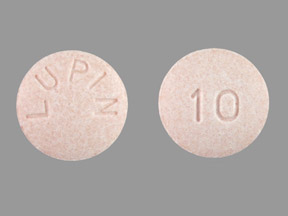Lisinopril Interactions
There are 403 drugs known to interact with lisinopril, along with 7 disease interactions, and 2 alcohol/food interactions. Of the total drug interactions, 44 are major, 329 are moderate, and 30 are minor.
- View all 403 medications that may interact with lisinopril
- View lisinopril alcohol/food interactions (2)
- View lisinopril disease interactions (7)
Most frequently checked interactions
View interaction reports for lisinopril and the medicines listed below.
- Aspir 81 (aspirin)
- Aspirin Low Strength (aspirin)
- CoQ10 (ubiquinone)
- Crestor (rosuvastatin)
- Cymbalta (duloxetine)
- Eliquis (apixaban)
- Fish Oil (omega-3 polyunsaturated fatty acids)
- Januvia (sitagliptin)
- Jardiance (empagliflozin)
- Lantus (insulin glargine)
- Lasix (furosemide)
- Lexapro (escitalopram)
- Lipitor (atorvastatin)
- Lyrica (pregabalin)
- Metoprolol Succinate ER (metoprolol)
- Metoprolol Tartrate (metoprolol)
- Nexium (esomeprazole)
- Norco (acetaminophen / hydrocodone)
- Ozempic (semaglutide)
- Plavix (clopidogrel)
- Singulair (montelukast)
- Synthroid (levothyroxine)
- Tylenol (acetaminophen)
- Vitamin B12 (cyanocobalamin)
- Vitamin C (ascorbic acid)
- Vitamin D2 (ergocalciferol)
- Vitamin D3 (cholecalciferol)
- Xanax (alprazolam)
- Zoloft (sertraline)
- Zyrtec (cetirizine)
Lisinopril alcohol/food interactions
There are 2 alcohol/food interactions with lisinopril.
Lisinopril disease interactions
There are 7 disease interactions with lisinopril which include:
- angioedema
- bone marrow suppression
- hemodialysis
- hyperkalemia
- hypotension
- liver disease
- renal dysfunction
More about lisinopril
- lisinopril consumer information
- Compare alternatives
- Pricing & coupons
- Reviews (631)
- Drug images
- Side effects
- Dosage information
- Patient tips
- During pregnancy
- Support group
- Drug class: Angiotensin Converting Enzyme Inhibitors
- Breastfeeding
- En español
Related treatment guides
Drug Interaction Classification
| Highly clinically significant. Avoid combinations; the risk of the interaction outweighs the benefit. | |
| Moderately clinically significant. Usually avoid combinations; use it only under special circumstances. | |
| Minimally clinically significant. Minimize risk; assess risk and consider an alternative drug, take steps to circumvent the interaction risk and/or institute a monitoring plan. | |
| No interaction information available. |
See also:
Further information
Always consult your healthcare provider to ensure the information displayed on this page applies to your personal circumstances.


